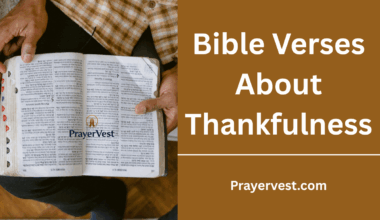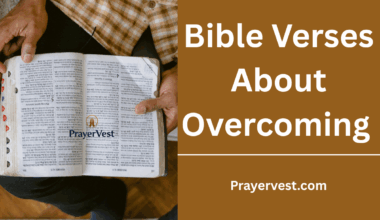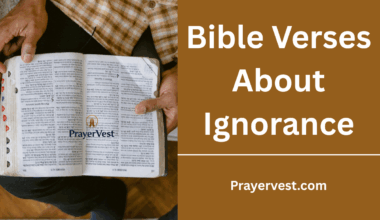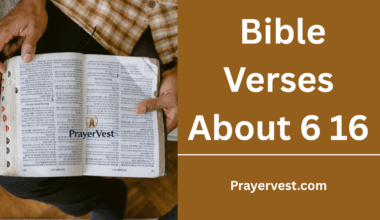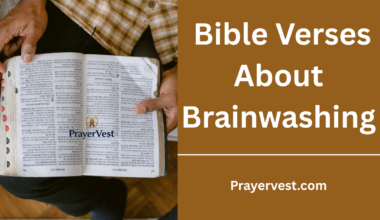Throughout Scripture, giving thanks to God is a major subject. The Bible consistently exhorts believers to acknowledge God’s sovereignty, mercy, and provision in every situation, from the Psalms to the letters of the apostles.
Being grateful is more than just a kind gesture; it is a spiritual practice that changes our viewpoint, deepens our relationship with God, and aligns our hearts with His desire. Gratitude spontaneously overflows our hearts when we acknowledge God as the ultimate source of life, blessings, and direction.
Gratitude is both an attitude and an action, as Bible texts about praising God teach us. They teach us to trust that God’s timing and purposes are perfect and to give thanks both in times of adversity and in times of plenty.
According to Scripture, being grateful is a potent way to show our faith since it allows God to enter our lives and opens our hearts to His joy and serenity. By recognizing that God is the source of all good gifts, whether material or spiritual, believers cultivate humility and a greater dependence on Him.
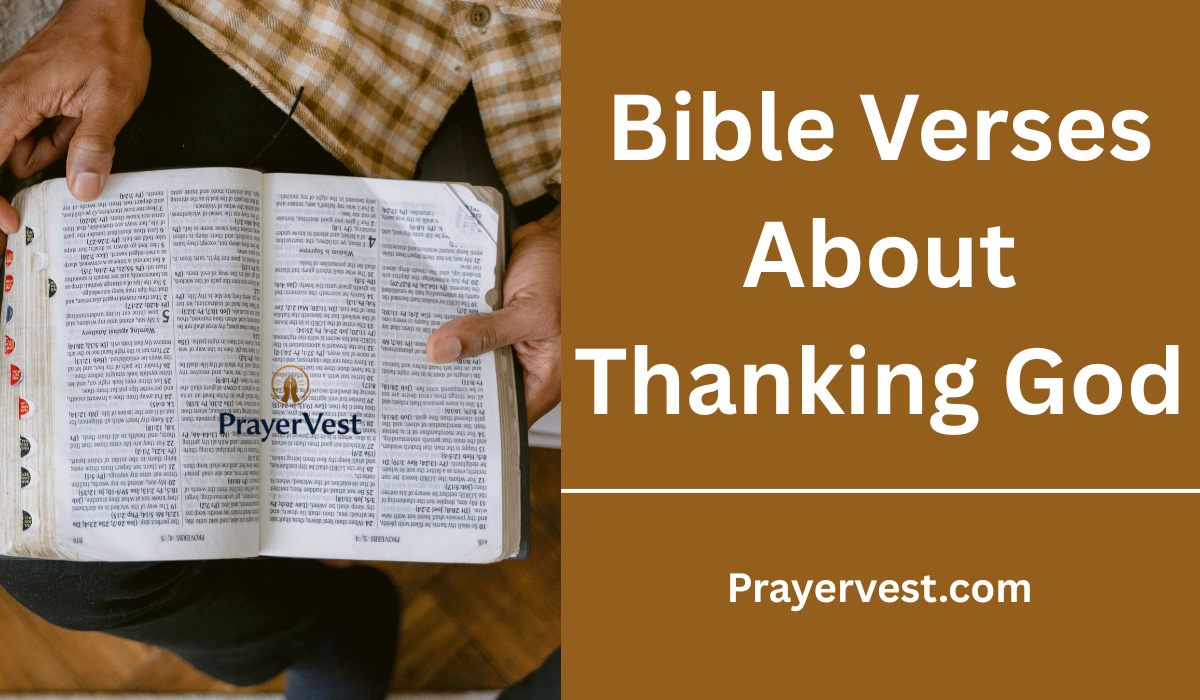

Furthermore, giving thanks to God is a part of everyday life and group worship as well as private devotion. In order to show that thankfulness is active and evident, the Bible exhorts believers to honor God via songs, prayers, and deeds of service. In addition to honoring God, we encourage others to see His goodness by fostering an attitude of gratitude. We are encouraged to consider our own lives, acknowledge God’s mercies, and develop a heart that delights in His unwavering faithfulness as we study these stirring scriptures about giving thanks.
40 Inspiring Bible Verses About Thanking God (2026)
1. Psalm 9:1
“I will give thanks to you, Lord, with all my heart; I will tell of all your wonderful deeds.”
David’s declaration of gratitude is wholehearted and unreserved. True thanksgiving is not half-hearted but springs from a sincere recognition of God’s goodness and mighty works. This verse teaches us that gratitude is both personal and public—it overflows into praise that inspires others to see God’s hand at work.
2. 1 Thessalonians 5:18
“Give thanks in all circumstances; for this is God’s will for you in Christ Jesus.”
Paul exhorts believers to maintain a heart of thanksgiving regardless of life’s conditions. Gratitude is not reserved only for seasons of abundance but is a constant posture of faith that acknowledges God’s sovereignty. This verse reminds us that thanksgiving aligns us with God’s will and strengthens us in every situation.
3. Psalm 107:1
“Give thanks to the Lord, for he is good; his love endures forever.”
This refrain, repeated throughout Scripture, anchors thanksgiving in God’s unchanging character. His goodness and steadfast love are eternal, offering believers a foundation for gratitude that is not dependent on changing circumstances. True thanksgiving flows from recognizing God’s everlasting love.
4. Colossians 3:17
“And whatever you do, whether in word or deed, do it all in the name of the Lord Jesus, giving thanks to God the Father through him.”
Here, Paul connects thanksgiving to every aspect of daily living. Gratitude is not confined to moments of prayer or worship but should saturate our actions, words, and relationships. By doing all things in Christ’s name with a thankful heart, believers reflect God’s glory in everyday life.
5. Philippians 4:6
“Do not be anxious about anything, but in every situation, by prayer and petition, with thanksgiving, present your requests to God.”
Paul contrasts anxiety with prayerful thanksgiving. Instead of being consumed by worry, we are invited to approach God with grateful hearts, even in our petitions. This verse shows that thanksgiving is an act of trust—acknowledging that God hears us and will provide according to His perfect will.
6. Psalm 100:4
“Enter his gates with thanksgiving and his courts with praise; give thanks to him and praise his name.”
This verse illustrates that thanksgiving is the key to entering God’s presence. Gratitude prepares our hearts for worship and opens the door to deeper communion with Him. It reminds us that thanksgiving is not optional but foundational in our relationship with God.
7. Ephesians 5:20
“Always giving thanks to God the Father for everything, in the name of our Lord Jesus Christ.”
Paul emphasizes the consistency of thanksgiving—“always” and “for everything.” Even in trials, believers can find reasons to be grateful, knowing that God is working all things together for good. Thanksgiving becomes a lifestyle when rooted in Christ’s name and authority.
8. Psalm 118:28
“You are my God, and I will praise you; you are my God, and I will exalt you.”
Thanksgiving here flows from personal recognition of God’s identity. The psalmist doesn’t speak about God in general terms but declares Him as “my God.” Gratitude deepens when we see God not as distant but as personally present in our lives.
9. Jonah 2:9
“But I, with shouts of grateful praise, will sacrifice to you. What I have vowed I will make good. I will say, ‘Salvation comes from the Lord.’”
From the belly of the fish, Jonah demonstrates gratitude even in dire circumstances. His thanksgiving is tied to the recognition that salvation belongs to the Lord. This verse shows that gratitude can transform despair into hope.
10. Hebrews 12:28
“Therefore, since we are receiving a kingdom that cannot be shaken, let us be thankful, and so worship God acceptably with reverence and awe.”
Thanksgiving is presented here as a response to receiving an unshakable kingdom. Gratitude is not just emotional—it’s an act of worship. Our thankfulness acknowledges the eternal security and unchanging promises of God.
11. Psalm 28:7
“The Lord is my strength and my shield; my heart trusts in him, and he helps me. My heart leaps for joy, and with my song I praise him.”
Here, gratitude is expressed through joy and song. The psalmist connects trust in God with heartfelt thanksgiving, showing that gratitude often flows naturally from reliance on God’s protection and provision.
12. Colossians 2:6-7
“So then, just as you received Christ Jesus as Lord, continue to live your lives in him, rooted and built up in him, strengthened in the faith as you were taught, and overflowing with thankfulness.”
Thanksgiving is described as an overflow of a life rooted in Christ. Spiritual growth and deep faith naturally produce gratitude. When our lives are centered in Christ, thanksgiving is not forced but abundant.
13. Psalm 136:1
“Give thanks to the Lord, for he is good. His love endures forever.”
This repeated refrain emphasizes God’s eternal love as the foundation of thanksgiving. It reminds us that gratitude is anchored not in temporary blessings but in God’s enduring character.
14. Daniel 2:23
“I thank and praise you, God of my ancestors: You have given me wisdom and power, you have made known to me what we asked of you, you have made known to us the dream of the king.”
Daniel’s thanksgiving arises from answered prayer and divine revelation. Gratitude here acknowledges God as the source of wisdom, power, and guidance. It shows us the importance of thanking God not only for material blessings but also for spiritual insight.
15. Psalm 95:2
“Let us come before him with thanksgiving and extol him with music and song.”
Thanksgiving is portrayed as communal worship. It is not only a private act but something believers are called to share. This verse highlights the joy and unity that gratitude brings to the worshiping community.
16. 1 Chronicles 16:34
“Give thanks to the Lord, for he is good; his love endures forever.”
This timeless declaration is both a command and a reminder. Gratitude flows from an acknowledgment of God’s goodness, which is not seasonal but everlasting. The verse also links thanksgiving with God’s enduring love—a love that sustains through trials, uplifts in moments of weakness, and anchors us in seasons of joy. Gratitude is not dependent on fluctuating circumstances but is grounded in the eternal, unfailing nature of God’s love.
17. Psalm 30:12
“That my heart may sing your praises and not be silent. Lord my God, I will praise you forever.”
The psalmist expresses that gratitude naturally overflows into praise and song. Thanksgiving is not meant to be muted but voiced, declaring God’s faithfulness for all to hear. This verse emphasizes that gratitude leads to testimony. When we thank God, we are not just acknowledging His goodness privately but proclaiming it publicly, allowing our lives to be living songs of praise that inspire others.
18. Revelation 7:12
“Saying: ‘Amen! Praise and glory and wisdom and thanks and honor and power and strength be to our God for ever and ever. Amen!’”
In this heavenly scene, thanksgiving is part of eternal worship. Gratitude is not only a present discipline but a future reality in eternity, where saints and angels alike magnify God forever. This verse reveals that thanksgiving is more than a human act—it is part of the eternal language of heaven. By practicing gratitude now, we align ourselves with the eternal worship that will never end.
19. Psalm 92:1
“It is good to praise the Lord and make music to your name, O Most High.”
This verse reminds us that thanksgiving and praise are inherently good—they are fitting responses to God’s greatness. Music and worship become the vehicles through which gratitude is expressed, turning thankful hearts into instruments of praise. Thanksgiving here is shown to be restorative, uplifting, and deeply beneficial to the soul. When we thank God, we not only honor Him but also bring peace and joy into our own lives.
20. 2 Corinthians 9:11
“You will be enriched in every way so that you can be generous on every occasion, and through us your generosity will result in thanksgiving to God.”
Paul connects thanksgiving with generosity. When God blesses us, it is not merely for personal enjoyment but to bless others, creating a ripple effect of gratitude. Our giving leads to others thanking God, multiplying praise. This verse shows us that thanksgiving is not passive—it is active and contagious, spreading from one life to another through acts of kindness and generosity.
21. Psalm 103:2
“Praise the Lord, my soul, and forget not all his benefits.”
David reminds his soul not to neglect gratitude. Forgetfulness is often the enemy of thanksgiving, as we tend to overlook God’s daily mercies. By recounting God’s blessings—whether forgiveness, healing, or provision—we rekindle a spirit of thankfulness. Gratitude is cultivated when we intentionally remember God’s goodness and meditate on His benefits.
22. Colossians 4:2
“Devote yourselves to prayer, being watchful and thankful.”
Paul instructs believers to weave thanksgiving into their prayer life. Gratitude here is paired with watchfulness, showing that prayer is not only about requests but about recognition of what God has already done. Thanksgiving becomes the heartbeat of prayer, transforming it from a list of needs into a dialogue of trust, praise, and faith.
23. Psalm 69:30
“I will praise God’s name in song and glorify him with thanksgiving.”
Here, gratitude is linked with glorifying God. Thanksgiving is more than polite acknowledgment—it is an act that magnifies God’s greatness. Through thanksgiving, we elevate God above our circumstances, declaring that His goodness outweighs our struggles. Gratitude in song becomes a spiritual weapon, shifting our focus from problems to the One who reigns above them all.
24. 1 Timothy 4:4
“For everything God created is good, and nothing is to be rejected if it is received with thanksgiving.”
Paul affirms that gratitude sanctifies everyday life. Even simple things like food and daily provisions become sacred when received with thanksgiving. This verse reminds us that gratitude transforms ordinary blessings into holy experiences. Nothing is too small to thank God for, and when we approach life with a grateful spirit, we begin to see His hand in all things.
25. Psalm 116:17
“I will sacrifice a thank offering to you and call on the name of the Lord.”
This verse shows that thanksgiving is not always easy or convenient—it can be a sacrifice. Gratitude is sometimes expressed in faith, even when circumstances are hard. A thank offering represents a deliberate choice to honor God regardless of feelings or situations. True thanksgiving is costly because it requires surrender, humility, and trust in God’s faithfulness.
26. Psalm 34:1
“I will extol the Lord at all times; his praise will always be on my lips.”
David commits to constant thanksgiving, regardless of circumstance. Gratitude is not seasonal but continual, a habit of the heart that turns every moment into an opportunity for praise. This verse reminds us that thanksgiving is not dependent on mood or external blessings—it is a conscious decision to keep God’s goodness at the forefront of our words and thoughts.
27. 1 Chronicles 29:13
“Now, our God, we give you thanks, and praise your glorious name.”
This declaration comes from David as he leads Israel in giving toward the building of the temple. Gratitude here flows from both generosity and community worship. It highlights that thanksgiving is not only an individual act but a collective one—when God’s people unite in gratitude, His name is exalted and glorified before all.
28. Psalm 7:17
“I will give thanks to the Lord because of his righteousness; I will sing the praises of the name of the Lord Most High.”
The psalmist anchors gratitude in God’s righteousness. Unlike temporary blessings, God’s justice and holiness are eternal reasons for thanksgiving. This verse teaches us to thank God not only for what He does for us but also for who He is—unchanging, righteous, and worthy of praise.
29. 2 Samuel 22:50
“Therefore I will praise you, Lord, among the nations; I will sing the praises of your name.”
David’s thanksgiving here is missional. Gratitude is not confined to private devotion but becomes a testimony to the nations. When we thank God openly, we bear witness to His faithfulness and invite others into the experience of His goodness. Thanksgiving thus becomes a form of evangelism, drawing others to know the God we praise.
30. Psalm 50:14
“Sacrifice thank offerings to God, fulfill your vows to the Most High.”
This verse connects gratitude with obedience. Thanksgiving is not merely verbal but is demonstrated through faithful action and commitment. Offering thanks is a spiritual sacrifice, showing that gratitude is more than words—it is expressed in a life lived in reverence and dedication to God.
31. Nehemiah 12:46
“For long ago, in the days of David and Asaph, there had been directors for the musicians and for the songs of praise and thanksgiving to God.”
This verse highlights the enduring tradition of structured thanksgiving in worship. Gratitude was not left to chance but was intentionally organized as part of the people’s spiritual rhythm. It reminds us that thanksgiving is central to worship and should be cultivated as an intentional discipline in both personal and corporate life.
32. Psalm 79:13
“Then we your people, the sheep of your pasture, will praise you forever; from generation to generation we will proclaim your praise.”
Here thanksgiving is linked to identity—we are God’s people, His sheep. Gratitude flows from recognizing our dependence on Him as our shepherd and provider. The verse also looks forward, showing that thanksgiving is generational. Each generation is called to pass down the legacy of gratitude, ensuring that God’s praise never ceases.
33. Jeremiah 30:19
“From them will come songs of thanksgiving and the sound of rejoicing. I will add to their numbers, and they will not be decreased; I will bring them honor, and they will not be disdained.”
In this prophecy of restoration, thanksgiving is the natural response to God’s deliverance and blessing. Gratitude is not only personal but communal, filling the atmosphere with songs of joy. This verse reveals that when God restores His people, thanksgiving overflows, transforming despair into celebration.
34. Psalm 138:1
“I will praise you, Lord, with all my heart; before the ‘gods’ I will sing your praise.”
David’s gratitude is bold and wholehearted, even in the presence of idols and false gods. Thanksgiving here becomes an act of spiritual warfare and declaration, exalting the true God above all rivals. It teaches us that gratitude is not passive—it is a powerful witness of our loyalty to God in a world full of distractions and counterfeits.
35. Ezra 3:11
“With praise and thanksgiving they sang to the Lord: ‘He is good; his love toward Israel endures forever.’”
At the laying of the temple foundation, God’s people erupted in thanksgiving. Gratitude here is tied to God’s covenant love and faithfulness across generations. Even in the early stages of rebuilding, thanksgiving was prioritized, teaching us that we don’t have to wait until completion to thank God—we can be grateful even in the beginnings.
36. Psalm 147:7
“Sing to the Lord with grateful praise; make music to our God on the harp.”
This verse links music and gratitude as natural companions in worship. Thanksgiving is not meant to be dry or mechanical but joyful and creative. When we thank God with song, we engage both heart and spirit, turning gratitude into a celebration that reflects the beauty and abundance of God’s blessings.
37. Luke 17:15-16
“One of them, when he saw he was healed, came back, praising God in a loud voice. He threw himself at Jesus’ feet and thanked him—and he was a Samaritan.”
In the story of the ten lepers, only one returned to thank Jesus. His gratitude set him apart, demonstrating that thanksgiving is not only right but deeply valued by God. This passage reminds us that gratitude should never be taken for granted—thankfulness is a vital response to God’s mercy and healing in our lives.
38. Psalm 136:26
“Give thanks to the God of heaven. His love endures forever.”
This closing line of Psalm 136 seals the theme of God’s enduring love. Thanksgiving here is universal—God is not only the Lord of Israel but the God of heaven. His love transcends boundaries, generations, and circumstances. Gratitude is our eternal response to His boundless mercy and covenant love.
39. 2 Corinthians 4:15
“All this is for your benefit, so that the grace that is reaching more and more people may cause thanksgiving to overflow to the glory of God.”
Paul connects grace with overflowing thanksgiving. As God’s grace spreads, gratitude multiplies, glorifying Him. This verse reminds us that thanksgiving is not only personal but exponential. When God works in one life, it impacts others, creating a chain reaction of gratitude that brings Him glory.
40. Psalm 145:10
“All your works praise you, Lord; your faithful people extol you.”
This verse affirms that all creation testifies to God’s greatness, but it is the faithful who lift their voices in conscious thanksgiving. Gratitude here is portrayed as both universal and personal, with God’s people leading the way in giving thanks. Thanksgiving, then, is not just a spiritual duty but a privilege that unites us with the rest of creation in glorifying the Creator.
Conclusion
Reflecting on these Bible passages about giving thanks to God serves as a reminder that gratitude is a way of life, rather than just a fleeting emotion. We develop hearts that are humble, cheerful, and sensitive to God’s presence when we recognize His goodness, mercy, and provision in every situation. Giving gratitude, as Scripture repeatedly teaches, deepens our faith, changes our viewpoint, and makes room for God’s blessings and peace to pour out into our lives in abundance. Gratitude is a potent spiritual practice that molds our character and strengthens our bond with Him, in addition to being an act of worship.
Furthermore, giving thanks to God inspires us to live deliberately and acknowledge His influence in all facets of our life. Expressing thankfulness, whether by prayer, praise, or deeds of service, serves to remind us of His faithfulness and encourages others to pursue His kindness as well. We are encouraged to go beyond simple words as we absorb these texts, allowing gratitude to guide our thoughts, actions, and relationships. A life based on thankfulness ultimately reflects God’s love, exalts His glory, and brings us nearer to the abundant life He intends for each of His children.

